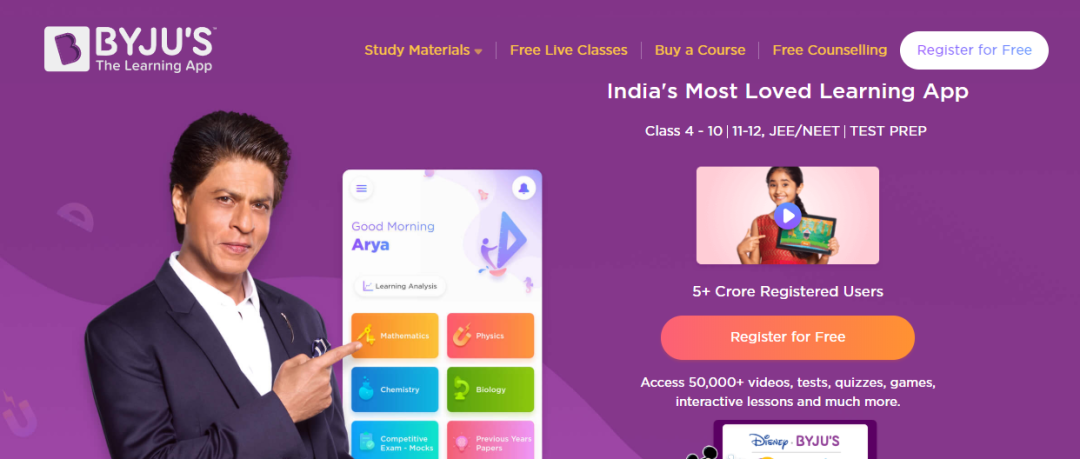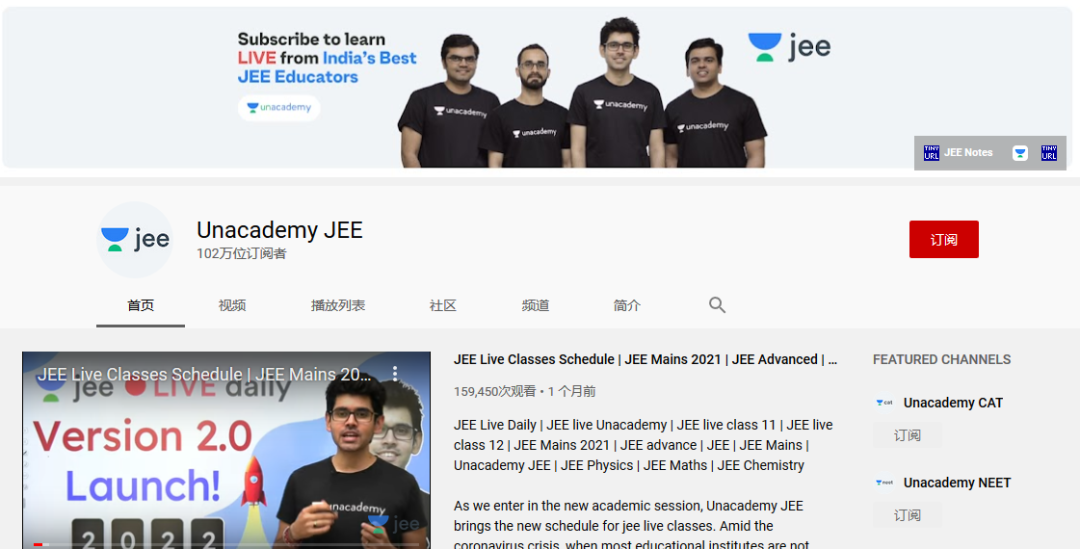It took 5 years to take off to accelerate.
Editor’s note: This article is from the micro-channel public number “sea Outlook” (ID: Globalinsights) , Author: Kazakhstan that.
Bang of “Peng”, the balloon broke. At this time, the stage lights changed and the background music sounded.
The famous Indian actor Shahrukh Khan appeared on the stage with young people and began to dance. A group of quite energetic performers and very Indian-inspired tunes make this scene look like the pictures in Bollywood cabaret movies.
But in fact, this is just a publicity advertisement for the Indian education technology company BYJU’S. On the stage, everyone’s dance is also for the creative display of the “Pythagorean Theorem” (a²+b²=c²) to emphasize the flexibility and innovation of online teaching. Invite big-name celebrities to endorse, madly output magic ads, sponsor Indian national sports cricket matches, and as the head player of online education in India, BYJU’S is making unremitting efforts for the education market.
At the same time, BYJU’S, who stepped on important nodes during the rapid rise of the industry, has also grown into a hot star project at this stage. In April of this year, IT Orange made statistics that BYJU’S, which was founded in 2015, had raised 12 rounds, with a total value of 7.8 billion yuan. Its post-investment valuation was nearly 8.2 billion US dollars. At that time, it was the world’s highest-valued educational startup.
In early May, according to foreign media reports, in response to the surge in business volume, after completing two rounds of financing this year, BYJU’S is planning to raise a new round of capital, with a valuation of US$10 billion. BYJU’S, whose valuation has soared in a short period of time, is a microcosm of the current fast-growing Indian online education industry.
Under the influence of many factors such as solidification of social class, lack of public education resources, and a huge user base (only K12 has reached 260 million people), online education has become one of the fastest rising industries in the Indian Internet industry This huge potential market has even attracted the entry of Chinese giants such as Tencent, ByteDance, and NetEase, and it will become a key time node in 2019.
In 2020, catalyzed by the epidemic “Black Swan”, this industry that has been running all the way since 2015 has once again accelerated its speed and entered the fast track of development in the new era.
In 5 years, in a limited space and time, online education in India has accelerated a butterfly change.
2015: “Takeoff” of Online Education in India
Raj and his wife Mita finally collapsed.
The poor environment in which slums are full of rubbish and rats are making them extremely uncomfortable. Especially not long ago, in order to allow her daughter to enter a key private school with high tuition fees, as an ordinary middle-class couple in India, they simply “swollen faces and become fat” and moved their children into a high-end community with a school district. But they ended up losing in the admission interview. So in order to get a small amount of enrollment from key private schools to poor families, the family of three moved to the slums and began to pretend to be poor.
From the “high society” to the poor gathering place, the contrast is too great. But Raj and Mita must endure. After all, it is a big thing to be able to enter a good school. For the future of their daughter, the two people feel that it is worth doing anything, even if there is a series of embarrassing things that make people laugh.
Perhaps this comedy movie “Starting Line” released in 2017 is somewhat exaggerated in storytelling, but it also reflects to a certain extent the situation of India’s current education industry. Under the influence of various factors such as the chronic diseases of the caste system, solidification of the social class, and lack of educational resources, India’s public education system and private education system are severely polarized. The former is lagging behind while the latter is limited.
Because the education situation in public schools in India is not ideal, after-school tutoring has become a public demand
In this hugely demanding market, the online education industry that can break through time and space restrictions and provide relatively fair educational resources has a natural growth soil in India. Especially in 2015, Indian Prime Minister Modi proposed the “Digital India” plan to promote the digital transformation of India’s economy and society. Government-level involvement has allowed India’s Internet industry to develop rapidly, and online education has also ushered in unprecedented historical opportunities.
In August 2015, Byju’s launched an online learning app. This educational company, founded many years ago, has officially set foot online.
Byju’s is a brand founded by Byju Raveendran, a former engineer of the British shipping company Pan Ocean. After setting up offline training institutions in many cities in India, Byju Raveendran began to use the Internet to provide students with online courses such as live broadcast and recording, and officially established the company in 2011.
Byju’s official website
In the beginning, Byju’s mainly provided online courses for students in grades 4-12, involving mathematics, physics, chemistry and other subjects. The design of these courses is derived from the years of offline teaching experience that founder Byju Raveendran has accumulated. At the same time, Byju’s hopes to develop individualized teaching plans for each student through technical means.
Years of offline word-of-mouth accumulation, the advanced online education method of “teaching according to the aptitude”, and rigidity have enabled Byju’s online education products to quickly accumulate users. Officials said that 3 months after the app was released, there were already 2 million registered students.
Byju’s profitable way of selling hardware in conjunction with teaching content. By mid-2017, Byju’s had 8 million users and 400,000 annual paying users. In the process, with the increase in the number of users, Byju’s has successively added training courses for undergraduates and graduate students, and even launched education products covering grades 1 to 3 last year.
In 2015, the online education company Unacademy was established in Bangalore. The founding team’s plan is to build Unacademy as “India’s largest online learning platform to meet users’ language, various exam training, career development and other learning needs. Two years after its establishment, the platform has more than 6,000 courses covering 500 Multiple subjects.
In the beginning, they set up a channel on YouTube, and then only launched the App. However, the former is still an important distribution and traffic acquisition channel for Unacademy. Until now, its video still has 150 million views on YouTube every month.
Unacademy’s YouTube homepage



